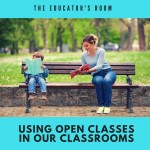By guest writer Michelle Wood
I consider myself a development coach, maybe, but I don’t know if that really captures what I do. (Does any title really capture all that we do?) I am a high school English teacher, a secondary new teacher mentor for my district, a health and wellness coach for women, and a wife, a mom, a friend, a daughter, a colleague.
In our work, when we have so much on our plates: check boxes on to-do lists, perform and be evaluated by others, report data on the impact of our efforts… it’s difficult to remember why, and who we are as professionals. In the crush of our “priorities,” we forget to examine our own motivations. What are we doing? Why did we choose this? What are we hoping to empower our students to do and achieve and believe?
The moments I have cherished most and when I feel most successful in my classroom and with my mentee teachers are when I can empower them to define and connect their intentions to their purpose. How can they be their best selves? Achieve a better life? However, they define that for themselves can give them a huge boost in internal motivation. That is why I teach life and empowerment and healthy habits of self-love and self-care and community contribution through my English classroom and my mentoring role.
Honestly, English (reading literature and connecting it to the real world through symbolism and writing and expressing myself in words) has just come easier for me than some. So I went that direction as a professional educator. Now I find myself taking that skill to another level in order to reach more, support more, and help more students feel capable, to define, and make a plan for a better life for themselves. And don’t get me wrong, they don’t always feel it. It’s a struggle. I acknowledge that struggle. But I now see my role as a force that encourages reflection and building momentum towards something. Anything. Building momentum forward.
A month ago, I had my students watch a TED Talk from Shawn Achor about the power of positive psychology. Achor argues that when we build and maintain what he calls “happy habits” we then become more successful in our personal and professional lives. These habits include journaling, listing gratitudes, meditation, exercise, and practicing unprompted kindness towards others. It’s a 12-minute video and I ask my students take notes about the habits Achor describes and explain them in their own words. I then provided them a PDF of a Happiness Log in our online Google Classroom that they could print off and use if they wished to try this theory. I offered extra credit for 21 days of tracking their “happiness habits” and reflecting on the process. More than extra credit, I encouraged them to do this as a healthy method of stress relief going into Final Exams at the end of the month and as a way to address our conversation around New Year’s Resolutions. I hoped this would be a more tangible way they could connect to their own fulfillment and create positive, lasting changes in their lives.
Colleagues questioned me. “How do you have time to do this in addition to your regular curriculum?” I replied: “I make time.” My hypothesis was that with happier, more balanced, more resilient students who are focused on the positive, their learning would be more efficient and enjoyable–for all of us!.
With the trendy topics these days surrounding brain research and the science of stress and poverty and diversity, how these things impact the abilities and connection our students make to long-term goals and achievements and effort, I feel that my role is so much more than their teacher, or a mentor to new teachers. I feel that my role is to live the fullest, happiest, and most connected life I can–connected to myself and my purpose and refilling my cup, and connected to how I can empower and encourage everyone I come in contact with to do the same. It’s worth it. And for the first time in my life, I am confident in this ability I have to help people uncover the gifts they have inside themselves. Do I have naysayers? Do I get kids who roll their eyes? Of course! But I’m slowly growing out of that middle school girl I used to be who would have been crushed by that. It’s a thicker skin, some call it, but it’s also a open heart and a willingness to be vulnerable if it means I can be happier and healthier and know others can grow from it as well.







